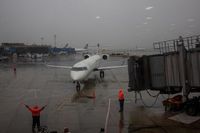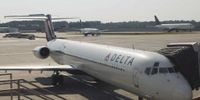Delta Air Lines is experiencing a significant slowdown in revenue growth as it navigates through an increasingly uncertain economic landscape marked by global trade tensions. In its first-quarter earnings report released on April 9, 2025, the airline revealed that while it managed to beat profit estimates, revenue figures fell just short of analyst expectations.
CEO Ed Bastian expressed concern over the current climate, stating, "The level of uncertainty that we're facing coming out of the global trade discussions and skirmishes is a bit unprecedented." Despite this uncertainty, Delta's stock rose more than 3% during premarket trading on the same day, indicating some investor confidence in the airline's resilience. However, this comes after a rough week where Delta's shares had plummeted by 15% due to the volatility sparked by the Trump administration's tariff policies.
In the first quarter ending March 31, Delta reported an adjusted net income of $298 million, surpassing the expected $253 million. Its adjusted earnings per share were $0.46, beating the anticipated $0.39. However, revenue of $12.98 billion narrowly missed the $12.99 billion forecast. This mixed performance reflects the challenges Delta faces as it attempts to adapt to shifting market conditions.
Looking ahead, Delta anticipates flat year-over-year revenue growth for the second quarter, a notable shift from earlier expectations of growth. The airline's guidance suggests a cautious approach as it prepares for what Bastian described as a "slower-growth environment." He added, "With broad economic uncertainty around global trade, growth has largely stalled." This sentiment underscores the airline's strategy to protect its margins and cash flow by focusing on controllable factors.
Notably, Delta's earnings release did not address the recent crash-landing of Endeavor Air flight 4819 in Toronto, with the company prioritizing the discussion around economic policies over operational incidents. Investors are keenly aware of how such events could impact the airline's financial health, especially as investigations into the crash continue.
In terms of corporate travel, Delta has reported a decline in revenue growth, attributing this to a reduction in corporate confidence. The airline noted that corporate travel sales were up only by low single digits compared to the previous year, primarily driven by the banking and technology sectors. Bastian remarked on the shift in travel demand, stating, "In the last six weeks, we've seen a corresponding reduction in broad consumer confidence and corporate confidence." This observation aligns with a broader trend of companies reassessing their business travel strategies amid economic uncertainty.
Delta's planned expansion of flying capacity for the second half of 2025 has also been put on hold, with the airline now expecting to maintain flat capacity year-over-year instead of the previously anticipated growth of 3% to 4%. This adjustment reflects the airline's response to disappointing bookings and the overall economic climate.
As Delta navigates these challenges, it remains the first major U.S. airline to release its earnings report for the quarter, setting the stage for others such as United, American, and Southwest, which are expected to report later this month. Analysts have already begun adjusting their earnings estimates and price targets for airlines, factoring in the fears of slowing demand and the impact of the current administration's policies.
Despite these hurdles, Bastian remains optimistic about Delta's profitability for the year, stating, "It would not be responsible to try to give an estimate in light of such uncertainty," while also affirming that the airline still expects to be profitable in 2025. This cautious optimism is a testament to Delta's historical resilience in the face of economic fluctuations.
In the broader market, Delta's performance is being closely watched as a barometer for the airline industry, particularly in light of ongoing trade discussions and their implications for consumer and corporate travel confidence. Investors will be looking for insights from Delta's competitors in the coming weeks to gauge the overall health of the airline sector.
With the airline industry constantly adapting to new challenges, Delta's situation highlights the significant impact of external factors such as trade policies on business operations. As the company moves forward, it will need to balance growth aspirations with the realities of the current economic environment, ensuring that it remains a leader in the competitive airline market.
As Delta Air Lines continues to navigate these turbulent times, its ability to adapt and respond to changing market conditions will be crucial in maintaining its position as one of the leading airlines in the United States.






